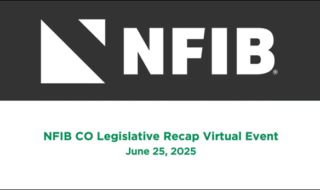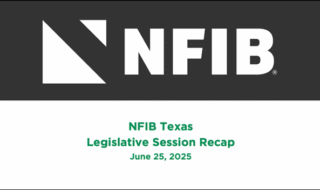March 21, 2024 Last Edit: July 22, 2024
“It’s no exaggeration to characterize the session as the least harmful to small business in more than a decade. No measures passed this year that NFIB opposed.”
State Director Anthony Smith reports from Salem on the small business agenda at the end of the 2024 session of the Oregon State Legislature
The Oregon Legislative Assembly adjourned sine die the 2024 legislative session on Thursday, March 7, which was Day 32 of the 35 day “short” session. The Oregon Constitution dictates that legislative sessions in even numbered years may last no more than 35 days, so unless lawmakers return to Salem for an unforeseen “special” session, the Oregon Legislature won’t convene again until January of 2025 for the next “long” session.
It’s no exaggeration to characterize the 2024 session as the least harmful to small business in more than a decade. NFIB opposed several bills that either did not move forward or were amended (based on our opposition) to the point where NFIB was neutral, but in the end, no measures passed this year that NFIB opposed.
With so much of the focus of the session on affordable housing, homelessness, and recriminalizing drug use, small business avoided the unwanted spotlight typical of years past which have led to tax increases, new regulations, and increased legal exposure. This wasn’t the case in 2024 – and while that was a very welcome development, it was also frustrating that we couldn’t get any traction on our most pressing priorities, for example, exempting more small businesses from Oregon’s Corporate Activity Tax (CAT).
Perhaps the most surprising legislation to come out of the 2024 session was a bipartisan deal on campaign finance reform that was negotiated and agreed to by the state’s largest businesses and labor unions. This bill has implications for how NFIB will engage in the political process in the future, but not until after the 2026 election cycle, when the new laws take effect.
Below you will find two lists of bills from the 2024 session with implications for Oregon’s small businesses – one list of notable bills that successfully passed and made their way to Gov. Tina Kotek’s desk, and one list of bills that were brought forward for consideration, but later died during the legislative process.
Please see below for a short summary of each measure, NFIB’s position on the bill, and the vote count in each chamber (for the one NFIB Key Vote). The bills are listed in numerical order.
2024 Small Business Bills: Passed
- SB 1580 – Workers’ Compensation Fraud
NFIB Position: Neutral (as amended)
SB 1580 clarifies that it is a crime for someone to file a false payroll report with the intention to lower workers’ comp premiums. Prior to the passage of SB 1580, Oregon law already specified that a person commits a Class A misdemeanor (punishable by a maximum of 364 days’ imprisonment, a $6,250 fine, or both) if that person files a fraudulent workers’ comp claim. Bad actors defraud the workers’ compensation system by filing fraudulent claims and, though less common, by filing false payroll records. Both methods of malfeasance negatively impact honest employers who pay for Oregon’s workers’ comp system, and prior to the passage of SB 1580, it was unclear whether a prosecutor could hold someone accountable for committing the crime of premium fraud. This bill simply clarifies that both types of fraud are illegal and able to be prosecuted.
- HB 4031 – Taxpayer Privacy
NFIB Position: Supported
HB 4031 clarifies that disclosure of taxpayer information, including specific taxpayer names, specific taxpayer amounts, and individual tax(payer) returns, is prohibited at the state and local level in Oregon.
- HB 4034 – State Reconnection to the Federal Tax Code
NFIB Position: Supported
HB 4034 updates the date for which Oregon’s state tax code is connected to the federal tax code. No major federal legislation passed in 2023, or thus far in 2024, so HB 4034 was considered “plain vanilla” reconnect bill. The closer Oregon’s tax code is to the federal code, the simpler it is for taxpayers to comply with state and federal tax laws – and the less likely an inconsistency could trigger a tax audit. Thankfully, even though conversations are still happening in Washington, DC surrounding some significant, possibly retroactive, tax reforms, the Oregon Legislature wisely stayed connected to the federal code for another year.
- HB 4111 – Farm Equipment Tax Exemption
NFIB Position: Supported
HB 4111 removes the distinction between tangible personal property and real property, making all equipment exempt that fits the statute’s definition of farm equipment. For years, farmers have been left to guess how their farm equipment might be taxed under Oregon confusing and outdated property tax system. There was inconsistency from county to county in how farm equipment was taxed, or exempt from tax, based on how it was used. HB 4111 was an NFIB Key Vote for the 2024 Oregon Legislative Session. The bill passed by a vote of 53 0 in the House, with 7 members absent. It passed by a vote of 28 0 in the Senate, with 2 members excused. For more information, click here.
2024 Small Business Bills: Failed
- SB 1542 – $5 Million CAT Exemption
NFIB Position: Supported
SB 1542 would have raised the current $1 million exemption for the Corporate Activity Tax (CAT) to $5 million. The $1 million threshold was originally sold as a small business exemption, but due to the pyramiding effects of this gross receipts tax, even the smallest of small businesses have seen substantial increases in costs. This has only been made worse by labor shortages, supply chain issues, inflation, and an increase in the overall tax burden on Oregon businesses in recent years.Raising the exemption and filing threshold would exempt more than 70% of the businesses that currently pay the CAT, nearly all of which are small businesses. In a recent NFIB survey, more than 80% of respondents supported this change in policy.SB 1542 was referred to the Senate Committee on Finance and Revenue and received a public hearing on February 12. NFIB testified in strong support during the hearing. Unfortunately, the bill did not move forward this year.
- SB 1573 – Contractor Wage Claim Liability
NFIB Position: Opposed
SB 1573 would have made general construction contractors liable for the unpaid wages of their subcontractors. This would have been a dangerous precedent to set, regardless of the specific industry being targeted because it would have fundamentally held the wrong party responsible for breaking the law. If this measure had passed, law abiding businesses would have been sued under this new private right of action for the illegal actions of other businesses. SB 1573 was referred to the Senate Committee on Judiciary, but the chair of the committee (who also happened to be the chief sponsor of the bill) cancelled the hearing before the committee convened that day. The bill was one of the first casualties of the 2024 session – officially dead after it did not move forward before the first chamber deadlines.
- HB 4005 – Professional Employer Organization Restrictions
NFIB Position: Opposed
HB 4005 would have made changes to Oregon’s employment laws in ways that would have impacted a relatively small number of businesses called Professional Employer Organizations (PEOs), but with a huge ripple effect for the small businesses they serve. At their core, PEOs give small businesses the administrative resources of large corporations and allow them to focus on their core products and services. HB 4005 would have effectively eliminated the PEO option for small businesses because the bill would have disallowed the “co employment” model that PEOs utilize to give small businesses economies of scale on their insurance products.HB 4005 was referred to the House Committee on Business and Labor and received a public hearing on February 12. NFIB submitted written testimony with the Oregon State Chamber of Commerce in opposition to the bill. The bill later died in committee.
- HB 4050 – Equal Pay Law Fix for Hiring & Retention Bonuses
NFIB Position: Supported
HB 4050 was a bipartisan bill that would have added language (used by several other states with similar laws) to Oregon’s Equal Pay Law. The provisions would have given Oregon employers the flexibility they need to utilize incentives to recruit and retain their workforce by allowing for a pay differential so long as it does not discriminate based on a specified protected class, it is consistent with a business necessity, and it fulfills the underlying purpose of that business necessity.The bill was referred to the House Committee on Business and Labor, where it had two public hearings on February 12 and February 14. Click here to view NFIB’s written testimony in support of HB 4050.Passage of HB 4050 would have made hiring and retention bonuses legal again in Oregon. Unfortunately, that didn’t happen, and Oregon remains the only state in the county with an Equal Pay Law that prohibits employers from paying their employees more money for these specific purposes.
On a Final Note …
The 2024 Oregon legislative session was a breath of fresh air. There’s little doubt lawmakers could have done more to make Oregon a more small business friendly state, but the fact that they didn’t make it worse is quite remarkable, given our recent history. That’s something we can be grateful for – and momentum we can build upon. Let’s keep the do no harm streak going next year and urge the Oregon Legislature to pick up where they left off with CAT reform and other pro small business policies!
Please reach out to NFIB if you have any questions about any of the bills you’ve read about in this report, even if you’re just looking for more detail. And if there’s a bill you tracked that isn’t on this list, we’ll be happy to investigate it for you. As a reminder, during session NFIB works on bills that affect a significant majority of our members, not every bill that could affect a single member. For those, we can help connect you with your industry specific group, your state legislators, or both!
Thank you for your support during the 2024 legislative session! We couldn’t do this important work without you!
Prior Legislative Reports
- February 10—Oregon Legislature Convenes for 2024 Session
NFIB is a member-driven organization advocating on behalf of small and independent businesses nationwide.
Related Articles














